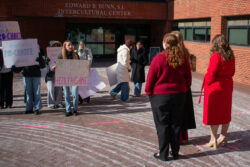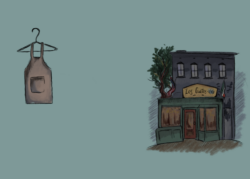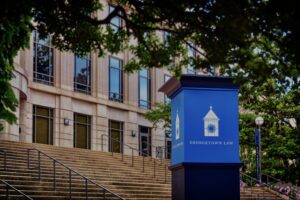In an open meeting between President John DeGioia and main campus faculty on Tuesday, plans to address the faculty’s stagnant salary increases were stalled again, to the dismay of some of the professors present.
“No one’s been happy with [the stagnant salaries],” Faculty Senate President Wayne Davis said. “On the other hand, everybody recognizes that the rest of the world fell off the financial cliff. Many people don’t have jobs. Other universities have complete freezes … However, if there’s nothing in this coming year, there will be greater consternation [among the faculty].”
Real increases in faculty salaries have been delayed since January 2009, when President John DeGioia announced that the University would be unable to meet the target increases of 2.5 percent above inflation as outlined in the Financial Plan for 2009 to 2011. At that same time, DeGioia also announced a wage freeze for himself and senior executives.

The financial plan for 2009 to 2011, published in January 2008, had announced a combined faculty salary adjustment rate of 4.94 rate, more than two percent above inflation at the time. When Georgetown realized it could not meet that commitment, DeGioia released a new financial plan that called for a lower salary increase of 2 percent, to be implemented in June 2009. Faculty did not receive a salary increase until January 2010, when they received a 2.5 percent adjustment.
Last spring, the Main Campus Planning Committee, which reports to the Provost and Board of Directors, proposed no salary increases among faculty and staff for Fiscal Year 2011.
Davis, who has been meeting regularly with the Main Campus Planning Committee to address the issue, said that drafting a new long-term faculty salary plan is an important part of the ongoing discussions on the 2010 Campus Plan, but that a concrete salary plan has yet to established.
That could be why several faculty members vented frustration about stalled salaries at Tuesday’s town hall meeting with DeGioia.
“I was wondering if you could explain to me how at a time when our own salaries are so stagnant…that your own salary has increased by two percent?” Professor of Theology Julia Lamm asked.
DeGioia acknowledged that, despite the freeze, his salary had increased because the Board of Directors decided to build a retirement fund from his compensation and that his housing was included as part of his salary for the first time.
Lamm said that “salary compression” at Georgetown is a serious issue, and that she felt obliged to ask the question because she was articulating the concerns of numerous faculty and staff.
The average salary for full professors at Georgetown, which is currently $155,500, according to the most recent data from American Association of University Professors—is already 10 to 15 percent below the average salary at Ivy League schools and schools Davis called “comparable institutions.”
Davis added that faculty salaries on the Main Campus are lower than those at the Law Center, which “has been prosperous for decades.”
“Their salaries are fully competitive [when compared with peer institutions] and quite good,” Davis said.
Despite the seeming lack of progress on the matter, Davis remains optimistic that the Main Campus Planning Committee can establish a new faculty salary plan by the end of the academic year.
“I am quite confident good news will emerge in a couple of weeks,” Davis wrote in an email, adding that a meeting will be held on Friday to discuss the matter. “The Main Campus has faced a tough time because of the effects of the recession, but has worked very hard to develop an even better salary long range salary plan than we had before.”
Davis said he is hopeful that the Main Campus Planning Committee meeting on March 5 will finalize the plan for faculty.





Oh, for heaven’s sake. You can’t compare your salaries to Ivy League professors’ because if you hadn’t noticed, the Ivy League is not nearby. The standard of living is not necessarily the same in Washington as it is in New York or Cambridge. Compare yourselves to the other universities in the District of Columbia, NOVA, and Maryland – oh, wait, you make more than all those people.
Frankly, Wayne Davis, if you actually care about salary parity, try addressing the fact that female faculty still make significantly less than male faculty at all levels. Assistant professors – the youngest faculty members and the ones who are most likely to have gone to graduate school during a time when men and women attended graduate school in equal numbers and with equal opportunities – make $13,000 more by virtue of being men instead of women.